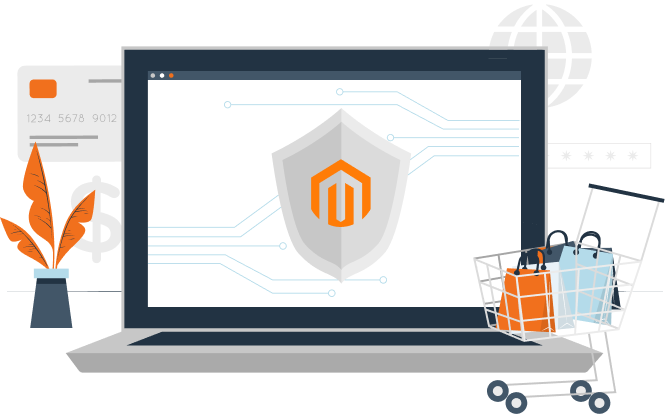Magento Security Issues:
Common Vulnerabilities You May Face In 2024

Magento Security Issues:
Common Vulnerabilities You May Face In 2024
Share post
Magento remains a cornerstone platform for thousands of ecommerce businesses. However, with great popularity often comes heightened attention from cybercriminals. Understanding Magento security issues is crucial for maintaining the integrity, performance, and trustworthiness of your online store.
In this article, we’ll explore the best practices to fortify your online store and give you the answers to the following questions:
Table of Contents
ToggleSecurity is one of the crucial features of any ecommerce website. You need to make sure that neither malware nor cybercriminals get access to your online store. Moreover, protecting your customer data and secure payments is important for any reputable merchant. So, why do you need to perform Magento security checks regularly? These are the possible consequences of the low level of website security protection:

Magento is a powerful platform with a vast number of features. However, it is not immune to diverse security challenges. To keep your Magento store safe, it is necessary to have a clear vision of the following potential vulnerabilities.
Cross-site scripting (XSS) attacks and credit card hijacking are significant security threats for any Magento website. They involve injecting malicious scripts into web pages, which can steal sensitive user information, manipulate content, or deface your Magento site. In some cases, XSS attacks can even rewrite your HTML web content.
Credit card hijacking is often one of the XSS goals. As a rule, it involves the theft of payment information through malware and insecure data storage. This issue can cause severe circumstances for your business and make your customers switch to more secure ecommerce platforms.
SQL injections are focused on getting access to your database. In this case, your data security is at high risk. Cybercriminals can use malicious SQL queries to steal your customers’ data, manipulate your product databases, and execute administrative functions that compromise your ecommerce store. To protect your Magento 2 website, it is important to use parameterized queries, implement thorough input validation, and regularly update your Magento platform to patch known vulnerabilities.
Brute force attacks are also targeted to the security of your Magento ecommerce website. In this type of attack, the cyberthieves usually use automated tools to guess passwords or authentication credentials to get access to your Magento admin panel. To mitigate the risk of brute force attacks, it is necessary to implement strong password policies, use two-factor authentication for added security, and monitor login attempts for unusual patterns.
Code execution attacks often occur when an attacker is able to execute arbitrary code on a server on which your Magento website is based. These attacks can lead to severe consequences, including unauthorized access to sensitive data, complete control over the server, and the disruption of your store’s operations.
Website defacement is a common type of code execution attack where cybercriminals modify the appearance of a website. These measures are used to display unauthorized content, including propaganda or offensive material. This issue can damage your ecommerce brand reputation and undermine your customer’s trust.
Botnetting is another security risk. It involves using compromised computers to perform large-scale malicious activities. In Magento environments, botnets can be used for distributed denial-of-service (DDoS) attacks to overwhelm and disrupt site functionality or to launch automated brute-force attacks against login pages. These attacks can significantly affect the performance and availability of your web store.
When it comes to protecting your Magento 2 ecommerce website, using just a couple of simple measures is never enough. You need to use numerous different practices to achieve excellent results. Here is a list of security best practices you can implement anytime to keep your website safe.
For any website, a hosting provider is like a basement for a house. To make sure your ecommerce store is safe to use and reliable, you need to choose a reputable hosting provider. Of course, most providers offer robust infrastructure and advanced security measures, but there are still some extra features you need to know about.
So, how can you choose a reputable hosting provider among dozens of alternatives? The answer is that it should include regular security updates, firewalls, intrusion detection systems, and daily backups. Moreover, a reliable provider maintains a secure environment and implements the best security features. For example, server hardening or providing SSL/TLS certificates for data encryption. To put it short, investing in a reputable hosting provider is a foundational step in safeguarding your Magento store against various cyber threats.
If you want to constantly maintain the security and performance of your ecommerce website, you need to use the most up-to-date version of the Magento platform. The reason is that every new Magento version includes crucial security patches and updates. They address the most common platform’s vulnerabilities and online threats. If you use the latest Magento version, you add an extra layer of security to your ecommerce store.
Additionally, new Magento versions often come with performance enhancements and new features. This means you can improve your website’s overall functionality and user experience in just a few clicks. To put it short, regular Magento upgrades are one of the key ways to fight Magento security threats.
Many merchants are wondering about whether they need to install SSL certificates. We believe this measure is a must for any online website. The truth is that it encrypts the data that is transferred between your website and its visitors. As a result, it protects loads of data with personal information. It protects your customers’ login credentials, payment information, and other confidential data. You also need to know that obtaining an SSL certificate is an obligatory measure to meet regulatory requirements. What is more, it improves your site’s SEO ranking.

Following strict login requirements is a necessary step to protect your ecommerce website from unauthorized access. Make sure to implement strong login protocols and use strong passwords. We also recommend using a two-step verification to add an extra security layer to your online store.
There are many Magento extensions that are focused on protecting your website’s security. You can choose one of the following options, properly implement it using Magento integration services, and be sure your ecommerce store is secured from any third-party interventions:

Web Application Firewall, also known as WAF, is another security solution for your ecommerce website. It can protect your store from numerous common threats. Its main function is to filter and monitor diverse HTTP requests. WAF detects and blocks malicious traffic before it reaches your server. It also helps you protect against various types of attacks, like SQL injections, XSS, and DDoS attacks.

If you don’t back up your data, you can lose tons of important information. Product descriptions, prices, clients’ details, and other crucial information can easily disappear at once if you become a victim of the cybercriminals. Regular backups allow you to have copies of your website’s files, databases, and necessary configurations. You can use this data in case of a cyberattack, hardware failure, or if you just accidentally delete some information. A comprehensive backup strategy is about creating frequent automated backups. One of the best practices will also be storing them securely in off-site locations or cloud storage services.
If you want to protect your online store, it is also essential to constantly monitor activities on it. This means you need to track the suspicious behavior of your visitors, complete the check-up in case of too many login attempts, and detect other unusual activities. Regular security scans will help you with all these measures.
Any merchant should have a clear understanding of PCI DSS (Payment Card Industry Data Security Standard) requirements. This is a set of security standards developed to protect the sensitive data of cardholders. It is crucial to follow these requirements to decrease the risks of fraud and breaches on your website. Mostly, you will need to pay attention to the following measures:
Having too many unused features enabled on your ecommerce store opens doors to numerous Magento security risks. The reason is that these features might contain some exploitable flaws and become real targets for hackers. If you disable unused functionality, you can significantly reduce the opportunities for cybercriminals to use your weaknesses.
CAPTCHA is a handy tool that can help you distinguish human users from automated bots. It can effectively block different kinds of bots from performing undesirable actions on your website. As a rule, CAPTCHA is used to protect ecommerce stores from brute attacks and spam, and it automatically sends fake reviews.
A unique link to your Magento admin panel can help you protect your website from unauthorized access and potential attacks. The reason is that many malware uses automated attacks and unauthorized login attempts with the most common default paths. It is better to create a unique URL for your admin panel that is not easy to guess.
All merchants would like to implement the highest possible level of protection in their ecommerce stores. However, even if you regularly use Magento security scan tools and other preventive measures, it is still necessary to have a “plan B” in case you face a cyberattack. This means you need to create a recovery plan if you lose access to your database or have issues with your website.
To protect your ecommerce store, it is better to follow all the rules mentioned in our Magento security checklist. However, identifying all your website weaknesses and preventing various kinds of attacks often turns out to be a challenge for many merchants. Therefore, it is better to entrust building, checking and updating your website to professional Magento developers.

Contact Us For a Free Consultation.
Performing Magento security checks is crucial to identifying and fixing vulnerabilities, protecting sensitive data, preventing financial losses, and maintaining customer trust.
Common Magento security issues include outdated software, weak passwords, unsecured extensions, inadequate user permissions, and insufficient data encryption.
Protect your store by choosing a reputable hosting provider, using the latest Magento version, installing an SSL certificate, enforcing strong login requirements (including two-step verification), using security extensions, deploying a Web Application Firewall (WAF), backing up data, monitoring activities, conducting regular Magento security audits, following PCI DSS requirements, disabling unused features, adding CAPTCHA, creating a unique URL for the admin panel, and developing a recovery plan.
Magento security extensions provide additional protection features such as malware scanning, firewall protection, and security patches, helping to secure your store against various threats.
Creating a fully secure and professionally looking website is often a complicated process. You need to meet all modern security standards, protect your customers’ data, and make sure your website performance and database are not reachable to the most common cyberattacks. If you want to make sure your ecommerce website is safe to use and protected, feel free to contact us.
Share This Article

 Magento SEO Guide: Best Practices for Magento Site Optimization
Magento SEO Guide: Best Practices for Magento Site Optimization